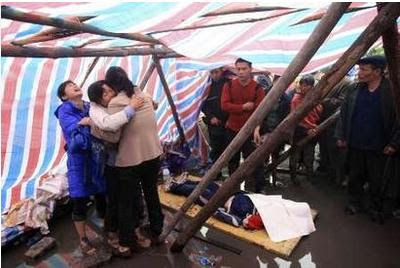
A day after the powerful 7.9 magnitude quake struck, state media said rescue workers had only just reached the epicenter in Wenchuan county — cut off by the disaster and where the number of casualties was unknown.
But the official Xinhua News Agency reported 10,000 people "remained buried" in Mianzhu, 60 miles from the epicenter.
Heavy rain, which had contributed to the difficulty of reaching the epicenter, continued to impede efforts and a group of paratroopers called off a mission to the area, Xinhua said.
The tremors caused a wide swath of damage across central China, leveling buildings and severing roads and communications. It sent people rushing out of their offices across the country in Beijing, and was felt as far away as Vietnam.
Nearly 10,000 people died in Sichuan province alone and 300 others in other provinces and the mega-city of Chongqing, Xinhua reported.
Earthquake rescue experts in orange jumpsuits extricated bloody survivors on stretchers from demolished buildings, and some 34,000 troops swarmed into the region to help.
A 40-car freight train with 13 gasoline tankers derailed in the quake and was still burning Tuesday, the agency said, with no word on casualties.
Aftershocks rattled the region for a second day, sending people running into the streets in the city of Chengdu. The U.S. Geological Survey measured the shocks between magnitude 4 and 6, some of the strongest since Monday's quake.
Just east of the epicenter, 1,000 students and teachers were killed or missing at a collapsed high school in Beichuan county. The six- or seven-story building was reduced to a pile of rubble about two yards high, according to Xinhua. Another 900 students were feared dead when their school collapsed in Juyuan, which is in Dujiangyan city.
The Beichuan school had more than 2,000 students and teachers in three school buildings. The other two buildings collapsed partially, Xinhua said.
Up to 5,000 people were killed and 80 percent of the buildings had collapsed in Beichuan, Xinhua said, in a region of small cities and towns set amid steep hills north of Sichuan's provincial capital of Chengdu. The government has poured more than 16,000 troops into the area with tens of thousands more on the way.
In Dujiangyan, rescue teams were trying to get to a woman who was eight months pregnant and trapped in a seven-story apartment building that collapsed.
Nearby, a man in his late 50s who refused to give his name, said his father was missing in the rubble of his home. "Yesterday, when the earthquake happened our home collapsed really quickly and I heard my father yell, 'Help, help, help,'" the man said.
Buildings were knocked down on every block and corpses were laid out in the street. People were seeking rides out of town, where makeshift tent cities were being erected as shelter from rain that began Tuesday and could affect rescue efforts.
Zhou Chun, a 70-year-old retired mechanic, was fleeing toward the city of Chengdu with a soiled light blue blanket draped over his shoulders.
"My wife died in the quake. My house was destroyed," he said. "I am going to Chengdu, but I don't know where I'll live."
Premier Wen Jiabao, who flew to the area to oversee rescue efforts, said a push was on to clear roads and restore electricity as soon as possible.
China's Ministry of Health issued an appeal for blood donations to help the victims of the quake. "There is a large demand for blood in quake-hit areas and we hope the public actively donate blood," spokesman Mao Quan said.
Before the rescue workers arrived, the only previous contact with hard-hit Wenchuan, Xinhua said, was a satellite phone call from the local Communist Party secretary to appeal for air drops of tents, food and medicine. The official, Wang Bin, said there were 57 reported deaths so far, with more than 300 other people seriously injured. He said the figures were likely to rise as there was no information from mountainous areas.
He estimated that at least 30,000 of the county's 105,000 residents slept outside Monday night.
Fifteen missing British tourists were believed to be in that area at the time of the quake and were "out of reach," Xinhua reported.
They were likely visiting the Wolong Nature Reserve, home to more than 100 giant pandas, whose fate also was not known, Xinhua said. It reported that 60 pandas at another breeding center in Chengdu were safe.
Disasters pose a test to China's communist government, whose mandate rests heavily on maintaining order, delivering economic growth and providing relief in emergencies.
Pressure for a rapid response was particularly intense this year, as the government was already grappling with public discontent over high inflation and a widespread uprising among Tibetans in western China while trying to prepare for the Beijing Olympics this August.
Expressions of sympathy and offers of help poured in from the United States, Japan and the European Union, among others. Even rival Taiwan, which is frequently hit by quakes and has highly developed expertise in rescue operations, offered aid.
"I am particularly saddened by the number of students and children affected by this tragedy," President Bush said in a statement. State Department spokesman Sean McCormack said no aid requests had been made by China.
The government said it would welcome outside aid but gave no specifics. Foreign Ministry spokesman Qin Gang said relief authorities "are ready to make contact with relevant countries and organizations."
Russia was sending a plane with rescuers and aid, the country's Interfax news agency reported. China's Ministry of Finance said it had allocated about $123 million, in aid for quake-hit areas.
The quake was China's deadliest since 1976, when 240,000 people were killed in the city of Tangshan, near Beijing in 1976.
The latest quake hit a fault where South Asia pushes against the Eurasian land mass, smashing the Sichuan plain into mountains leading to the Tibetan highlands — near communities that held sometimes violent protests against Chinese rule in mid-March.



